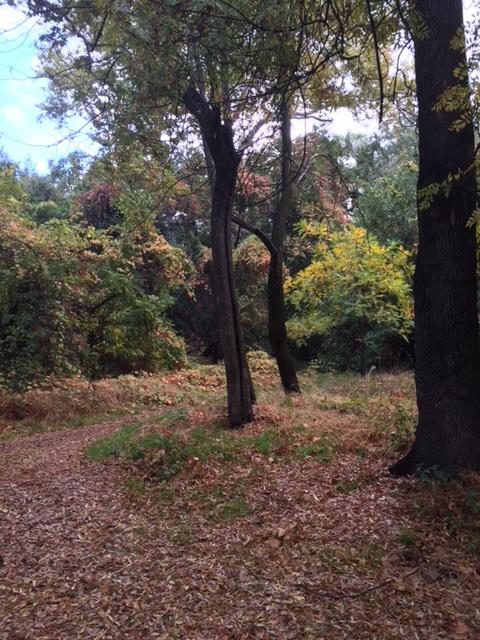Other than a downpour during the night a couple weeks ago, it was the first rain of the year. Living in a land where it doesn’t rain for four or five months during the summer, the first rain, coming when most of the leaves are still on the trees, released intense fragrances and feelings.
To the west, the sky was still dark, almost black; to the east, the sun shone brightly in a blue sky. In between clouds of fantastic shapes and color filled the sky.
Intending to take the car to the park for a meditation, I jumped on the bike for a quick ridearound to see the clouds. People were out, quietly celebrating, as the earth seemed to be celebrating after the drenching.
At the park, a man and his daughter on bikes were just leaving the picnic site about a half a mile from the footbridge. He was nice enough, in the superficial way most Americans are, but the girl, who was 11 or 12, was completely enclosed, lost in herself and her own thoughts as she gathered her things.
Sitting looking downstream facing out from the table, the light changed every minute, making the familiar spot completely new. One minute the sun was on the stream, flowing with nearly twice the volume of two days ago. The next minute the light was in the upper branches of the oaks and sycamores, golden as alpenglow.
The smell of foliage and earth was very pleasant, not pungent, almost sweet. Since most of the leaves are still on the trees and bushes (oranges, reds and browns mixed with remaining greens) you felt protected, enwrapped and enrapt.
An hour passed as if were a minute. Then it began to rain again, a gentle downpour. I walked back to the footbridge, and by the time I reached it, the rain had stopped. The parkland was empty and overflowing with the beauty earth. Why has man so little beauty when the earth is overwhelmingly beautiful?
Meditation is really nothing more than watching and listening without goal and effort, judgment and interference, to every movement within and without until attention gathers and there is no dichotomy between the movement within and without.
In right observation, there is no point in the field of thought and emotion from which one observes others points in the field. Passive watchfulness grows into a blazing fire of attention, incinerating every thought and emotion as they arise.
Watching and listening in this way, attention gathers, unseen and undirected, quieting the mind and emptying the heart of the detritus of experience.
The field of thought/emotion falls away, and there is nothing but the beauty of the earth and the strangeness of being alive. Being nothing–no thing–is everything, since only then is there complete being.
Brilliant light from the sun sitting on the horizon illuminated the earth and man-made world alike as I drove back. In a state of timelessness and ecstasy, with one’s senses, brain and body overwhelmed by beauty of earth, I found it difficult to drive the few miles back to the house.
Back at the house, the encounter with the father and his conditioned, already adult 12-year-old girl came to mind, and with it a tremendous talk I had at the end of the week with a leading scholar on moral development in children.
We touched on many things, and came away with this question: How are parents and teachers to nurture the moral development of children in a dead culture?
The problem of course is that the majority of parents and teachers have adapted to this dead culture by becoming dead themselves.
And if parents and teachers are, in the euphemistic vernacular, “numb,” how can the children they raise and educate not also become inwardly dead?
I just turned on the tube and learned of another mass slaughter in the United States, this time in a church in Texas.
Martin LeFevre


